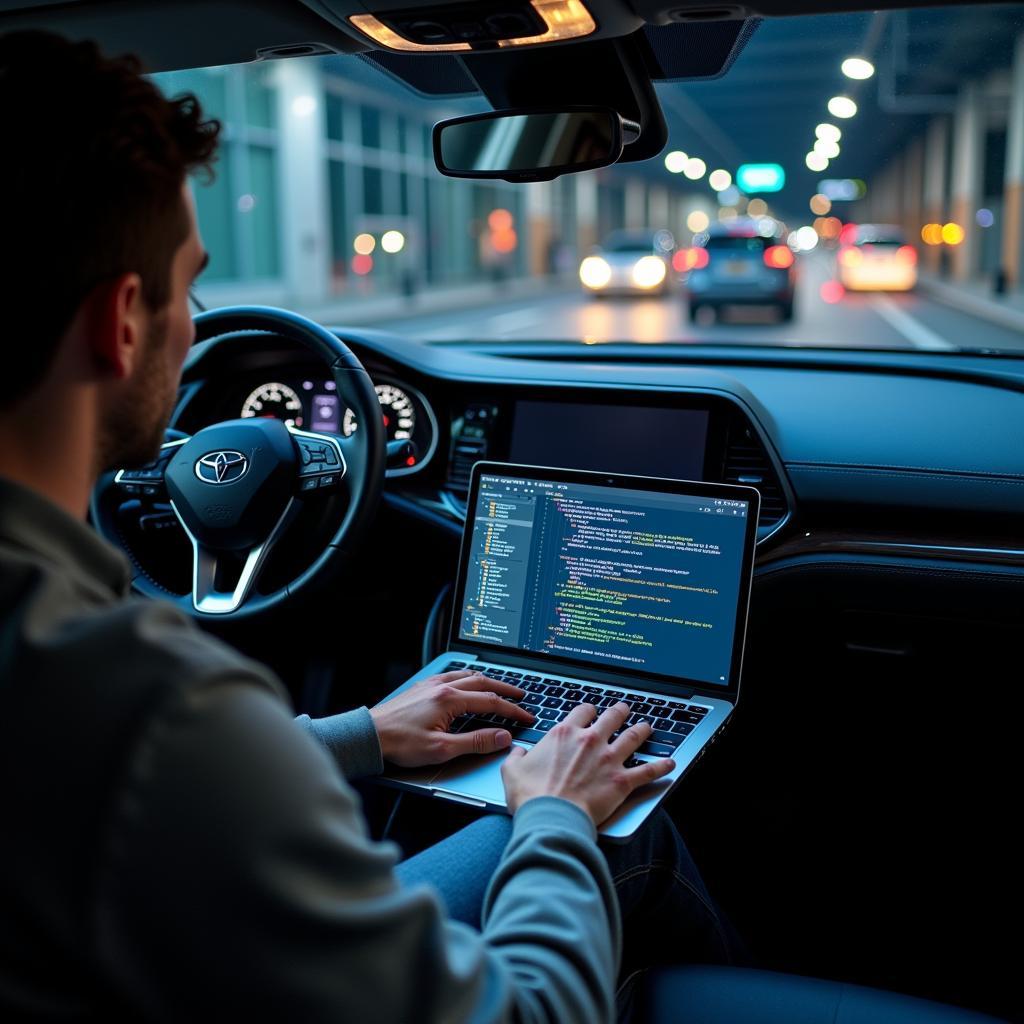Car hacking tools on Github have become a hot topic, raising concerns about vehicle security and the potential for misuse. These tools, often developed for legitimate purposes like research and diagnostics, can unfortunately fall into the wrong hands, leading to unauthorized access and potential harm. This article explores the complex landscape of car hacking tools on Github, examining their capabilities, the risks they pose, and the crucial role of responsible disclosure in mitigating these risks.
The Double-Edged Sword of Car Hacking Tools on Github
The open-source nature of Github provides a platform for developers to share and collaborate on projects, including those related to car hacking. This can be incredibly beneficial for security researchers who can use these tools to identify vulnerabilities and develop solutions. However, the same tools can also be exploited by malicious actors for illegal activities, such as stealing cars, manipulating vehicle systems, or even causing physical harm.
Legitimate Uses of Car Hacking Tools
Researchers and automotive professionals utilize these tools for various legitimate purposes:
- Vulnerability Assessment: Identifying weaknesses in car systems to improve security.
- Diagnostics and Repair: Accessing vehicle data for troubleshooting and repair.
- Security Training: Educating professionals on car hacking techniques and countermeasures.
- Software Development: Creating and testing new automotive software and security systems.
The Dark Side: Potential Misuse
While car hacking tools have legitimate uses, the potential for misuse is a serious concern:
- Theft: Bypassing security systems to steal vehicles.
- Data Breaches: Accessing personal data stored within car systems.
- Sabotage: Manipulating vehicle functions, potentially causing accidents.
- Unauthorized Surveillance: Tracking vehicle location and driver behavior.
 Car Hacking Tools on GitHub for Vulnerability Assessment
Car Hacking Tools on GitHub for Vulnerability Assessment
Understanding the capabilities and limitations of these tools is crucial for both professionals and car owners. This knowledge empowers individuals to take appropriate precautions and protect themselves from potential threats.
Navigating the Ethical Landscape of Car Hacking
The availability of car hacking tools on Github raises important ethical questions. Responsible disclosure is paramount. Researchers who discover vulnerabilities should report them to the relevant manufacturers, allowing them time to address the issue before publicly releasing the information. This collaborative approach helps protect car owners while promoting transparency and continuous improvement in vehicle security.
What is Responsible Disclosure?
Responsible disclosure involves privately informing the affected party about a discovered vulnerability, giving them a reasonable timeframe to fix the issue before making it public. This responsible approach minimizes the risk of exploitation while encouraging collaboration between security researchers and manufacturers.
Why is Responsible Disclosure Important?
- Minimizes Risk: Allows manufacturers to patch vulnerabilities before malicious actors can exploit them.
- Promotes Collaboration: Fosters a collaborative relationship between security researchers and the automotive industry.
- Builds Trust: Demonstrates a commitment to responsible security practices, building trust with consumers.
Protecting Yourself from Car Hacking Threats
While manufacturers are responsible for addressing vulnerabilities, car owners can also take steps to protect themselves:
- Stay Updated: Keep your car’s software up-to-date with the latest security patches.
- Be Cautious with OBD-II Ports: Avoid connecting unknown devices to your car’s OBD-II port.
- Use Strong Passwords: If your car has Wi-Fi or Bluetooth connectivity, use strong and unique passwords.
- Be Aware of Suspicious Activity: Report any unusual behavior or malfunctions to your dealership.
The Future of Car Security and Github
As cars become increasingly connected, the importance of cybersecurity will only continue to grow. Github and other open-source platforms play a vital role in this evolving landscape. By fostering collaboration and responsible disclosure, we can work towards a future where car hacking tools are used for good, improving vehicle security for everyone.
 Future of Car Security and GitHub Collaboration
Future of Car Security and GitHub Collaboration
Conclusion
Car hacking tools on Github present both opportunities and challenges. While these tools can be invaluable for research and development, the potential for misuse is a serious concern. By embracing responsible disclosure and promoting collaboration between security researchers and manufacturers, we can harness the power of open-source platforms like Github to improve car security and protect against emerging threats. The future of car security depends on our collective efforts to ensure these powerful tools are used responsibly and ethically.
FAQs
-
What is an OBD-II port? The OBD-II port is a standardized diagnostic interface in vehicles, allowing access to various data and systems.
-
Are all car hacking tools on Github malicious? No, many tools are designed for legitimate purposes like diagnostics and research.
-
How can I report a car vulnerability I found on Github? Follow the responsible disclosure guidelines and report the vulnerability directly to the affected manufacturer.
-
Can I use car hacking tools to improve my car’s performance? Modifying car systems without proper knowledge can be dangerous and void your warranty. Consult with a qualified professional.
-
What should I do if I suspect my car has been hacked? Contact your dealership or a trusted automotive security specialist immediately.
-
Are there laws against using car hacking tools? Yes, using these tools for illegal activities, like stealing a car, is against the law.
-
How can I stay informed about car hacking threats? Stay up-to-date on automotive security news and follow reputable security researchers and organizations.
Need further assistance? Contact us via WhatsApp: +1(641)206-8880, Email: [email protected] or visit us at 910 Cedar Lane, Chicago, IL 60605, USA. Our 24/7 customer support team is ready to help.

Leave a Reply